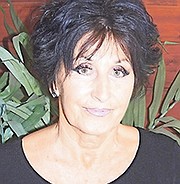By VICTORIA SARNE
Power: an evocative word, and a provocative one, especially when used in the same sentence as the word woman or female. It often evokes an emotional but negative reaction in many, so much so that we as women have been told not be too assertive, lest, heaven forbid, we be labelled aggressive or pushy – which is another way of saying unlikable or unfeminine.
It would be funny if it were not so sadly indicative of how far we have not come in our use of words describing or accepting male and female characteristics and behaviour.
There is no rational reason why it is OK to teach boys they should want to be “powerful” – in control of themselves and taking charge – so that they are able to go and get whatever they want out of life professionally and personally. But it is still not the general norm in most societies to teach girls the same attitude.
Even the most enlightened of us sometimes appear to have difficulty with this. We don’t seem to know, understand or accept the amount of innate the personal power we all have – male or female – nor how to use it wisely and not abuse or use it negatively. Our socialisation or upbringing does little to affirm or assure women that this is a positive or desirable characteristic and is the fuel to let us live the lives we want.
Women, more so than men, give away their power on a regular basis, sometimes every day – from the smallest to the largest of our daily interactions. We can’t necessarily blame our parents, caregivers or teachers, they were most likely simply behaving unthinkingly as they had been raised. Their behaviour as ours may have become automatic and ingrained. How often do you remember being asked to kiss an aunt or uncle or give a hug to anyone and you really didn’t want to? How often were you asked to give up something like a favourite toy to an older sibling or a visiting cousin and you didn’t want to? Too hard to challenge when you are very young, but unfortunately that idea becomes fixed in our minds as we mature and indeed is accepted as part of the social contract to which we acquiesce, making our everyday encounters acceptable to someone else. But is it acceptable to us?.
As adults we may give away our power by letting others make decisions for us, not saying ‘no’ when we we should, not saying anything if we are spoken to or touched inappropriately. Most importantly, not voting or acting proactively within our communities to address issues of concern. When this happens you are again letting others make important decisions that affect not only you and your children’s future, but potentially that of others.
If we work outside the home, my guess is that many of us, even when we are ambitious to do well and succeed in a chosen profession, will not ask for what we want, will defer to another in a position of authority, even if we know they are either mistaken or blocking our progress. We may not assert ourselves for more than one reason; again buying into the notion that if we do we will be perceived negatively. Or we are not brave enough, not confident enough because the system has taught us it’s not acceptable behaviour for us.
It’s always OK to ask clearly and concisely for what you want from a boss or a life partner. If you don’t ask, you are conceding power to them; that they have the singular right to choose for you, if only by default. And it’s always absolutely within your power and is your right to say ‘no’ if that’s how you feel or you need to protect yourself emotionally, physically, personally or professionally.
Shut out the noise around you or that inner voice that says you might not be liked for speaking up or you are afraid you could be wrong. Listen to your instincts. Learn how much more important they usually are and how accurate. This is where your power resides. Trust yourself; be confident and hold on to the potential ability to control the direction of the outcome.
• Victoria Sarne is an entrepreneur and writer. She headed a team to establish a shelter for abused women and children in Canada and was its first chairwoman. You can reach her at victoria.conversations@gmail.com, or visit www.lifelineswritingservice.com.





Comments
Use the comment form below to begin a discussion about this content.
Sign in to comment
Or login with:
OpenID